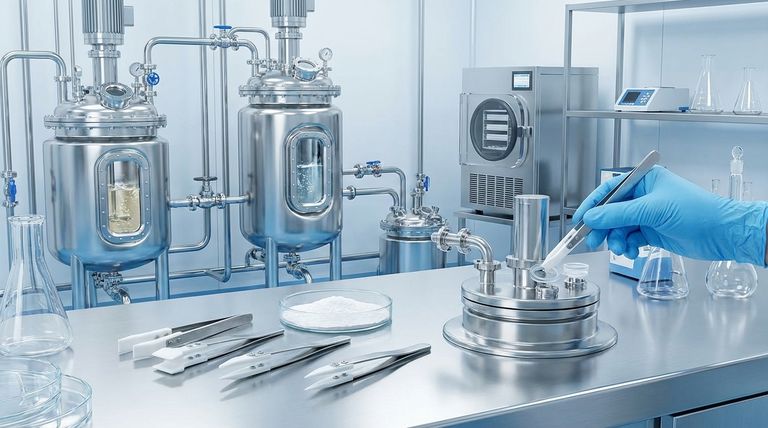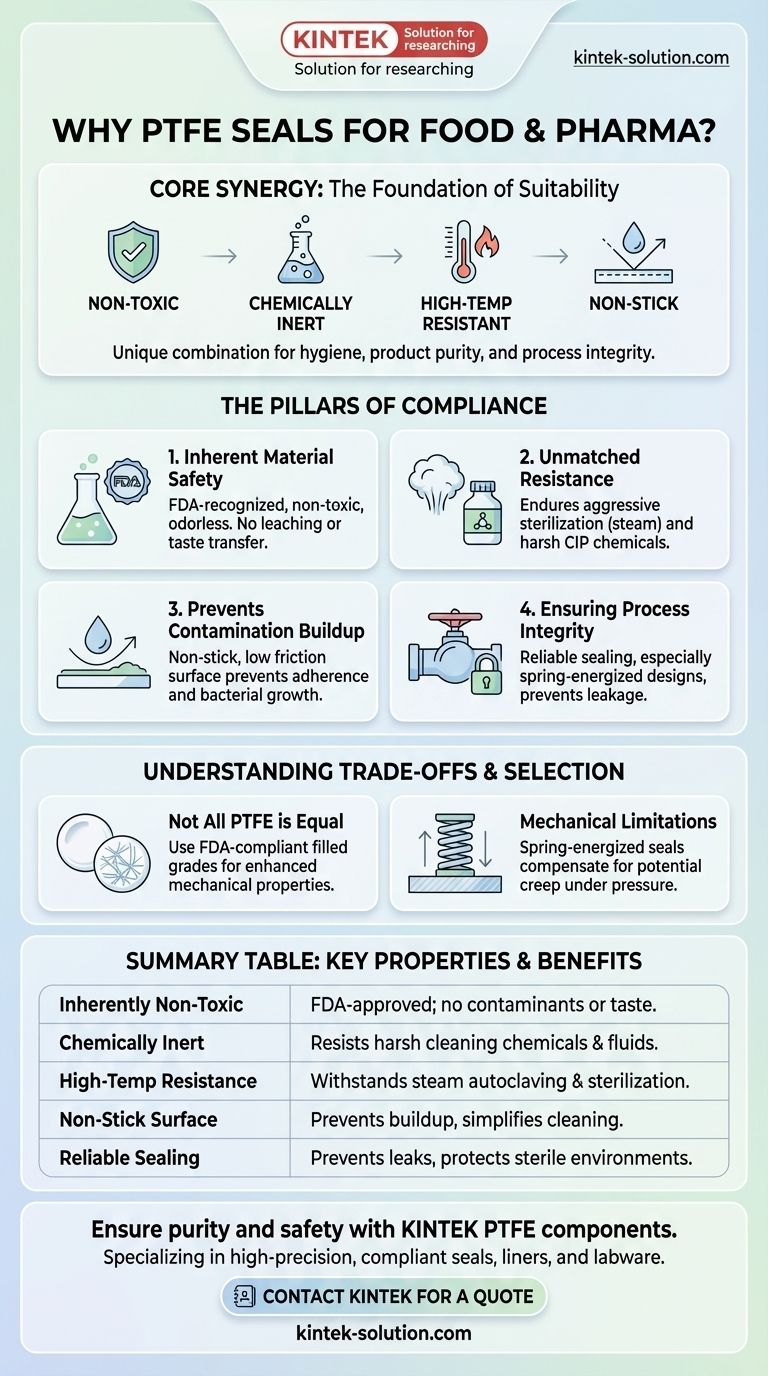At its core, PTFE's suitability for food and pharmaceutical applications stems from a unique combination of four key properties: it is non-toxic, chemically inert, resistant to high temperatures, and has an exceptionally non-stick surface. This synergy directly addresses the non-negotiable requirements for hygiene, product purity, and process integrity in these highly regulated industries.
The trust placed in PTFE is not due to a single feature, but its holistic ability to be both inherently safe for direct contact with consumables and robust enough to withstand the aggressive cleaning and sterilization protocols designed to protect them.

The Pillars of Compliance: Why PTFE Excels
To understand why PTFE is a default choice, we must look at how its properties solve the fundamental challenges of hygienic processing. It's about preventing contamination at every level: from the material itself, from operational residue, and from process failures.
Inherent Material Safety
PTFE is recognized and approved by regulatory bodies like the FDA as a food-grade material. It is fundamentally non-toxic, odorless, and non-contaminating.
This means the seal material itself will not leach harmful substances, impart any taste or smell, or otherwise compromise the integrity of the food or pharmaceutical product it touches.
Unmatched Chemical and Thermal Resistance
Food and pharmaceutical environments rely on aggressive cleaning and sterilization. This often involves high-temperature steam, powerful disinfectants, and various process chemicals.
PTFE's high thermal stability allows it to endure sterilization processes without degrading. Its near-total chemical inertness means it won't break down when exposed to the harsh chemicals used in Clean-in-Place (CIP) systems, ensuring a long and reliable service life.
Preventing Contamination Buildup
The surface of PTFE is famously non-stick, with an extremely low coefficient of friction. In a processing environment, this is a critical hygienic feature.
This property prevents particles of the media—be it a food slurry or a pharmaceutical compound—from adhering to the seal surface. This dramatically reduces the potential for bacterial growth and makes equipment significantly easier and more effective to clean.
Ensuring Process Integrity
In equipment like mixers, pumps, reactors, and blenders, the primary role of a seal is to prevent leakage. A leak can lead to product loss, but more critically, it can introduce external contaminants into a sterile environment.
Spring-energized PTFE seals, in particular, provide a reliable and consistent sealing force, preventing contamination and ensuring that sensitive processes remain contained and pure.
Understanding the Trade-offs
While PTFE is an exceptional material, selecting the correct type and design is crucial. Understanding its limitations is key to successful implementation.
Not All PTFE is Created Equal
While virgin PTFE is inherently compliant, various filled grades exist to enhance mechanical properties like wear resistance or load-bearing capacity.
For any food or pharma application, it is essential to ensure that not only the base PTFE but also any filler materials are FDA-compliant for the intended use.
Mechanical Limitations
PTFE is a relatively soft polymer and can be susceptible to creep or "cold flow" under high, constant pressure.
This is why seal design is so important. Features like a stainless steel spring in a spring-energized seal are used to compensate for this tendency, ensuring a consistent sealing force even under challenging mechanical conditions.
Making the Right Choice for Your Goal
Your final selection should be driven by the specific demands of your application, balancing compliance with operational performance.
- If your primary focus is direct food or drug contact: Verify that the specific PTFE grade is certified as FDA-compliant and suitable for your exact process temperatures and chemicals.
- If your primary focus is dynamic applications (e.g., pumps, mixers): Consider spring-energized or filled PTFE seals that provide enhanced mechanical stability and wear resistance while maintaining regulatory compliance.
- If your primary focus is ease of sanitation: Prioritize seals with a smooth, high-quality surface finish to maximize the benefit of PTFE's non-stick properties and ensure efficient cleaning cycles.
Ultimately, leveraging PTFE's unique properties ensures your processes are not only efficient but also uncompromisingly safe and compliant.
Summary Table:
| Key Property | Benefit in Food & Pharma |
|---|---|
| Inherently Non-Toxic | FDA-approved; will not leach contaminants or affect product taste/smell. |
| Chemically Inert | Resists harsh cleaning chemicals (CIP) and process fluids, ensuring long life. |
| High-Temperature Resistance | Withstands aggressive sterilization methods like steam autoclaving. |
| Non-Stick Surface | Prevents material buildup and bacterial growth, simplifying cleaning. |
| Reliable Sealing | Spring-energized designs prevent leaks, protecting sterile environments. |
Ensure your processes meet the highest standards of purity and safety with KINTEK PTFE components.
We specialize in manufacturing high-precision, compliant PTFE seals, liners, and labware for the semiconductor, medical, laboratory, and industrial sectors. Our expertise in custom fabrication—from prototypes to high-volume orders—ensures you get a solution tailored to your exact application needs, guaranteeing performance, durability, and regulatory compliance.
Contact KINTEK today to discuss your specific requirements and receive a quote.
Visual Guide

Related Products
- Custom PTFE Parts Manufacturer for Teflon Parts and PTFE Tweezers
- Custom PTFE Parts Manufacturer for Teflon Containers and Components
- Custom PTFE Sealing Tapes for Industrial and High Tech Applications
- Custom PTFE Sleeves and Hollow Rods for Advanced Applications
- Customizable PTFE Rods for Advanced Industrial Applications
People Also Ask
- What are the unique properties of PTFE? The 3 Pillars Driving Demand for High-Performance Parts
- What chemical processing applications involve PTFE-machined parts? Essential Components for Corrosive & High-Purity Systems
- What are the main applications of PTFE type Teflon? Unlock Its Versatility for Your Industry
- What are the unique properties of PTFE? Unlock Unmatched Performance in Demanding Applications
- What factors should be considered when choosing between Nylon and PTFE? Select the Right Material for Your Application



















